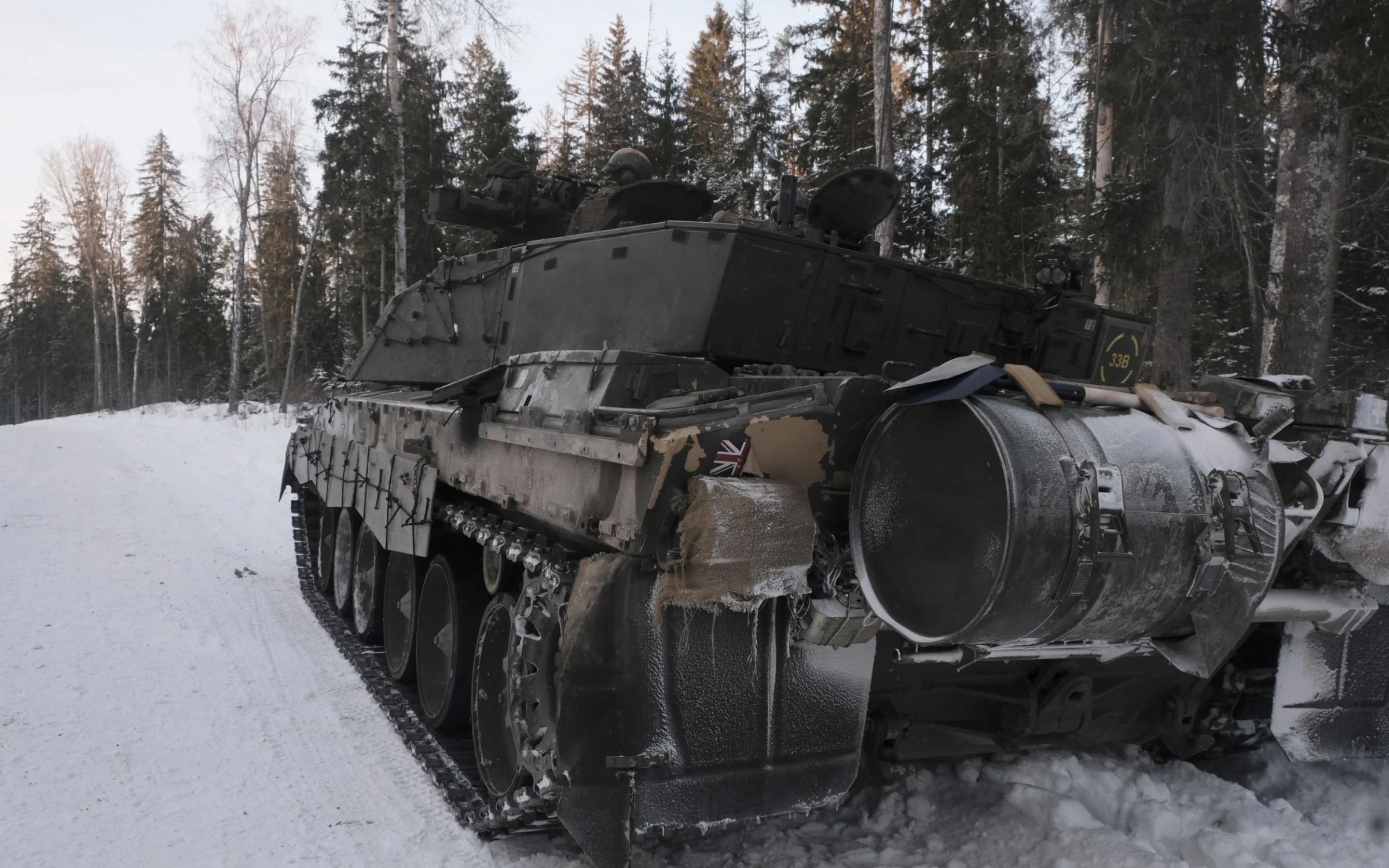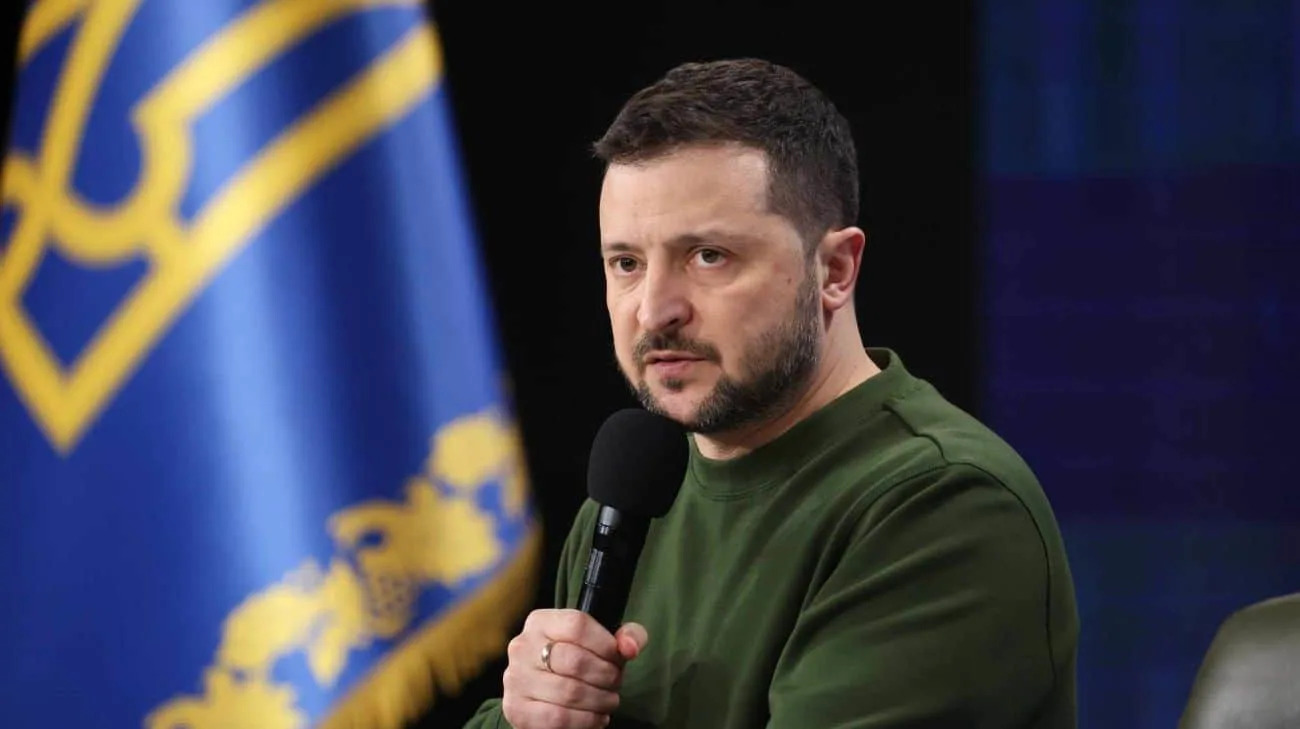Europe’s long peace is over. We must prepare for the coming wars

After decades of complacency, reality is starting to dawn. The world is not drawing inexorably closer, autocracies are not turning to democracy and liberalism, and geopolitical competition is growing more dangerous.
British Army servicemen with a Challenger 2 attend the military exercise Winter Camp.
The countries of Europe face multiple threats to their security. Russia continues to wage its war against Ukraine and could feasibly attack other countries in future. The Kremlin, Beijing and others work to undermine our security and stability at home too, stealing industrial and military secrets, launching cyber attacks and conducting so-called hybrid warfare.
Iran – which one day will achieve its aim to acquire nuclear weapons – uses its proxies to attack Western interests and undermine global trade routes. Al-Qaeda is regrouping under the Taliban in Afghanistan.
Islamists continue to operate freely across the continent, with terrorists plotting attacks, extremists spreading their radical ideology and hatred, and organisations connected to the likes of the Muslim Brotherhood given public money and the legitimacy of engagement with politicians, public bodies and the media. Among the millions of people streaming into Europe from North Africa and the Middle East are radicals and extremists – some of whom will inevitably attack and murder civilians.
From within Europe and without, powerful forces want to destroy our security, our prosperity, and our way of life. And even now, as the complacency fades, our readiness falls far too short. The migration crisis continues. Islamism is appeased, not confronted. And with China, short-term commercial interests trump long-term security risks.
Even as Donald Trump questions the future of Nato and Republicans in America withhold support for Ukraine, demanding Europe pays more for its own security, the debate about European defence capabilities resembles a hangover from another time. European capitals seem oblivious to the point that if Trump wins the next election, it is entirely likely that he will force Ukraine to cede territory and come to terms with Russia.
Some Republicans even speculate that he will give ninety days’ notice of his intention to tear up the Nato treaty. If this were to happen, it is likely it would be a characteristically aggressive negotiating stance designed to force the Europeans to increase their contribution to the alliance. Even still, such a move would embolden Vladimir Putin, shatter trust among the allies, and leave the Europeans under no illusions that in future they may well be on their own.
And the truth is that they might very well find themselves alone. This ought to be the most urgent fact in the politics of every country in Europe. Instead, the debate, to the extent that there is one, focuses on countries hitting the target to spend 2 per cent of GDP on defence – a target Nato governments agreed they would reach 10 years ago – and which candidate should be appointed the next Nato general secretary. Mark Rutte, the new favourite, is a formidable politician who handled Trump well as the Dutch Prime Minister, but it will not take Republicans long to realise that the wealthy Netherlands spends only 1.7 per cent of GDP on defence.
It is true that defence spending in Europe is increasing. Poland, for example, is up to 3.9 per cent of GDP. Other countries threatened by Russia – Estonia, Finland, Latvia and Lithuania – have all increased their spending significantly. But Europe as a whole still spends below 2 per cent, and key countries still lag behind. Germany has made commitments for future spending, but last year spent only 1.57 per cent of GDP on defence. France is not yet hitting the target, and while Britain does, it still spends less than it once did.
The question is no longer whether Europe can hit its 2 per cent target, but whether European countries have the capabilities they need to defend themselves and their interests – and what level of spending, and what kind of spending, will deliver that.
The likes of Italy and Spain spend around 60 per cent of their defence budgets on personnel, for example, whereas America spends around 28 per cent – less than it spends on major equipment and related research and development. Last year Nato countries combined spent $1.26 trillion on defence, but $860 billion of that was American spending – only $375 billion came from Europe.
Realistically, if Europe is going to take responsibility for its own security, its countries will need to spend sums more like 3 per cent of their combined GDP. And while all Nato countries now hit the target to spend 20 per cent of defence budgets on equipment, they will still need to invest more heavily in research and development and military technologies. To do this, and to coordinate capabilities, new agreements will need to be struck.
Given the severity of the threats we face, and the conviction that Europe will no longer be able to freeload – regardless of the identity of the next president – Britain ought to take a leading role in convening European leaders and begin this work now.
Together with France, Europe’s other leading military power, and working with key countries like Germany and Poland, the Government should call a security summit long before the US election.
Increased defence spending – especially when it goes on technology and research and development – can spill over into commercial and industrial success, as experienced in America and countries like Israel and Estonia. But there is little point pretending that bigger defence budgets will not mean tough choices. If they do reach 3 per cent of GDP, international aid spending for example will quickly look like an indulgence we cannot afford.
This is the reality of the world in which we live now. Eighteen per cent of Ukrainian territory is occupied by Russia, and 6.4 million Ukrainians are refugees. And while this phase of the war began two years ago, hostilities really began a decade ago when Putin invaded Crimea. History has always taught us that aggressors exploit weakness, and peace can only be won through strength. Whether the enemy is Russia, China or Iran, whether the threat is from terrorists at home or armies abroad, we must show we are stronger and more resolved than them.
Zelenskyy: It's up to US and Germany whether Ukraine will be invited to join NATO
President Zelenskyy during the 25 February press conference.
Ukrainian President Volodymyr Zelenskyy has said that whether Ukraine will be invited to join NATO during the Washington, DC summit in July 2024 depends on Germany and the US.
Source: President Zelenskyy during the press conference following the Ukraine.Year 2024 conference
Details: Zelenskyy said that as far as he knows, all of Ukraine’s partners support inviting it to join the North Atlantic Treaty Organization and believe that Ukraine will eventually join NATO.
"I don’t want to mince words here. As of today, with due respect to all partners, [whether Ukraine gets] the invitation depends on the United States of America and on Germany. That’s a fact," Zelenskyy said.
He stressed that he sees no risks inviting Ukraine to join NATO might pose.
Background:
-
US Ambassador to NATO Julianne Smith does not expect that Ukraine will be invited to join the North Atlantic Alliance at the summit in Washington, DC this summer.
-
Boris Ruge, NATO Assistant Secretary General for Political Affairs and Security Policy, also said that NATO members might not invite Ukraine to join the Alliance at the Washington, DC summit.
Zelenskyy: Ukraine isn't asking partners to deploy their armies on its territory
Ukraine is not talking to its partners about the possible deployment of their armies on its territory.
Source: President Volodymyr Zelenskyy during a press conference following the Ukraine. Year 2024 conference
Quote from Zelenskyy: "We are not talking to our partners about their armies being deployed in Ukraine.
If Ukraine joins NATO, which would be the most robust security guarantee for us, then I think we would trigger Article 5 [of the North Atlantic Treaty] if that happened. Though what we see [...] is that Russia is not attacking any of those countries."
Details: Zelenskyy also said that the decision to invite Ukraine to join NATO was in the hands of two countries, the US and Germany.
The Ukrainian president also reiterated that Ukraine has told the US that it needs to approve its aid package for Ukraine next month, and the US Congress is well aware of that.
Russia has failed in its efforts to undermine Ukraine’s statehood – NATO-Ukraine Council
The NATO-Ukraine Council has issued a statement on the second anniversary of Russia's full-scale invasion of Ukraine (24 February), commemorating the victims and expressing support for Kyiv.
Source: European Pravda, citing a statement from NATO-Ukraine Council
Details: "Russia has failed in its efforts to undermine Ukraine’s statehood and break the resolve of the Ukrainian people. Ukraine has prevailed as a sovereign and democratic nation, liberating significant territory and pushing back Russia’s Black Sea fleet," the statement reads.
The NATO-Ukraine Council blamed the Russian Federation for this war and condemned Russia's monstrous attacks on Ukrainian cities and civilian, energy and port infrastructure, some of which also affected the territory of the Allies.
"We also condemn all those who are facilitating Russia’s war and amplifying Russia’s disinformation. Russia must immediately stop this war and completely and unconditionally withdraw all of its military forces from Ukraine in line with UN General Assembly resolutions. We do not and will never recognise Russia’s illegal and illegitimate annexations, including Crimea," the statement stressed.
The Council noted that Allies are committed to supporting Ukraine for as long as it takes for it to gain victory.
"NATO continues to support Ukraine with urgently needed non-lethal equipment and supplies to strengthen Ukraine’s self-defence. NATO is committed to help strengthen and rebuild the Ukrainian security and defence sector, support Ukraine’s deterrence and defence in the long term, and transition Ukraine to full interoperability with NATO," the Council noted.
The NATO-Ukraine Council brings together Allies and Ukraine to work closely together and make decisions on an equal footing to support Ukraine's further integration into NATO in line with the decisions of the 2023 Vilnius Summit, the statement added.
Background:
-
For his part, NATO Secretary General Jens Stoltenberg expressed support for Ukraine on the second anniversary of the full-scale war unleashed by Russia.
-
The day before, NATO held a ceremony to mark the anniversary of Russia's full-scale invasion of Ukraine.
-
European Council President Charles Michel, European Commission President Ursula von der Leyen and European Parliament President Roberta Metsola issued a joint statement on the second anniversary of Russia's full-scale invasion of Ukraine promising assistance to end the war.
- Questions and Answers
- Opinion
- Story/Motivational/Inspiring
- Technology
- Art
- Causes
- Crafts
- Dance
- Drinks
- Film/Movie
- Fitness
- Food
- Games
- Gardening
- Health
- Home
- Literature
- Music
- Networking
- Other
- Party
- Religion
- Shopping
- Sports
- Theater
- Wellness
- News
- Culture
- War machines and policy



